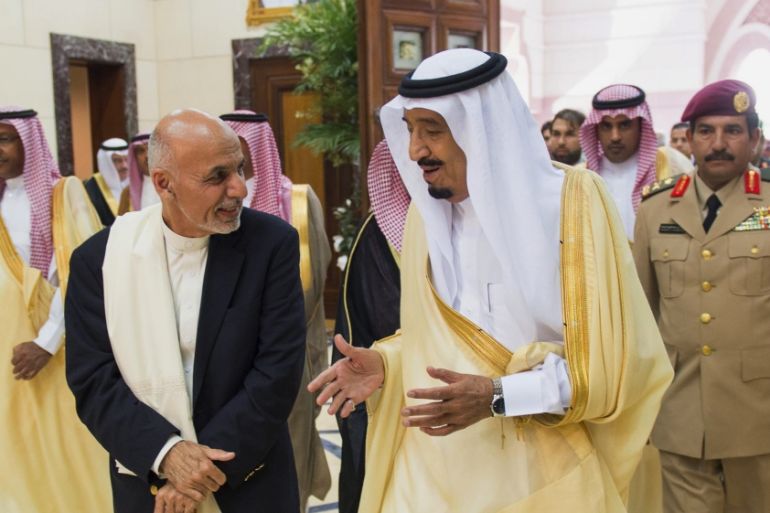Afghanistan stuck between Iran and Saudi Arabia
The formation of a Sunni coalition against Houthis in Yemen could spark sectarian violence in Pakistan and Afghanistan.

The United States’ secret talks with Iran, which first led to the interim accord and now to a preliminary nuclear deal, has had wider consequences in the region beyond the simple nuclear file. This accord has angered many US regional allies, and particularly Saudi Arabia, which considers Iran an arch-enemy – partly due to an old Sunni-Shia schism in Islam. The sectarian difference has been manipulated by both Saudi Arabia and Iran in their strategic competition for greater influence in the Middle East, which has undermined the stability of the entire region.
In addition, the US decision to pivot away from the Middle East, and its hesitation over Syria has created deep resentment and mistrust in Saudi Arabia and the rest of the Gulf Cooperation Council (GCC). This has pushed the Saudi government to rely less on US support and develop its own strategy to contain Iran’s emergence as a regional power.
|
|
Saudi Arabia’s options are limited. It was not in a position to exert influence over the P5+1 negotiations with Iran, and it doesn’t have the capacity to directly coerce the Iranian regime by using military threat.
Therefore, the only option at its disposition is to create a Sunni coalition around Iran, and thus exhaust Iran’s resources, similar to what the US did against the former Soviet Union during the Cold War.
Sectarian competition
The proxy conflict in Syria between Iran and the Sunni coalition led by Saudi Arabia has already spilled over to Iraq, and the rapid emergence of the Islamic State of Iraq and the Levant (ISIL) is a direct consequence of this sectarian competition.
Now the formation of an even broader Sunni coalition for military intervention against the Houthis in Yemen could provoke sectarian violence in Pakistan and Afghanistan. In fact, both countries have supported the Saudi-led air campaign in Yemen and are under heavy pressure to contribute military forces in case of a ground invasion.
For Saudis, Pakistan has always been a vital ally, offering its military and nuclear weapons as a protection for the kingdom. In exchange, they have provided substantial financial assistance to the Pakistani military. However, in recent years, Pakistan’s political leaders and the military have been working to forge a close relationship with Iran because of the US and India’s strategic alignment. Therefore, balancing its relationship between the two regional contenders in the backdrop of a significant power shift in the region becomes a hurdle for the current Pakistani leadership.
Afghans have a bitter memory of the proxy war between Saudi Arabia and Iran in the 1990s, which caused destruction and bloodshed in the capital city Kabul.
Taking part in the Yemen ground invasion would cause the unravelling of Afghanistan's unity government and a harsh reaction from Iran. Refusing to become a part of the wider Sunni coalition would cost Kabul the peace process and political isolation from the Saudi-led coalition.
The National Unity Government (NUG) in Kabul is between a rock and a hard place. The government’s decision to join the Sunni military coalition against Iran would have dire consequences. Even during the recent US and NATO intervention in Afghanistan, Iran played an important role and its legitimate interests in the country were respected.
Afghanistan has a common language with Iran and relies on it for its economic development. Moreover, there are close to 2 million Afghan refugees who reside in Iran. Many Afghans believe that a rapprochement between the US and Iran will reinstate Iran’s traditional role in the region and will relieve them from the grip of Pakistan as the only trade and transit route.
Saudi Arabia’s unique place
Meanwhile, Saudi Arabia has a unique place in the heart of most Afghans because of the presence of Islam’s holy sites. In addition, Saudi Arabia has generously supported Afghans in their struggle against the former Soviet Union.
After the fall of the Berlin Wall, Saudi policy in Afghanistan shifted from defeating communist ideology to containing Iranian influence in South and Central Asia.
Their political and religious leaders have believed that radical Sunni movements such as the Taliban constitute a natural obstacle to the propagation of a revolutionary Shia doctrine in the region, and thus invested heavily in radical madrassas in Pakistan, where a considerable number of Afghan and Pakistani youth sought religious education.
In addition, the kingdom was among the three countries that officially recognised the Taliban regime in 1996.
Since taking his official oath of office, President Ashraf Ghani has forged very close relationship with Saudi Arabia and has sought the kingdom’s intervention and support in the peace process with the Taliban. In fact, Saudi Arabia and a couple of GCC countries still carry some influence over the movement’s leadership. Without pressure from Saudi Arabia, the Taliban will not enter the peace dialogue with the Kabul government.
The future stability of Afghanistan rests on Ghani and the National Unity Government’s decision. Taking part in the Yemen ground invasion would cause the unravelling of Afghanistan’s unity government and a harsh reaction from Iran. Refusing to become a part of the wider Sunni coalition would cost Kabul the peace process and political isolation from the Saudi-led coalition.
Our own recent experience made us in favour of interventionism in the context of broader international coalition. However, we deplore the violence in Yemen in the context of sectarian competition because we are still haunted by the atrocities of our own civil war.
Haroun Mir is an Afghan analyst in Kabul and founder of Afghanistan’s Center for Research and Policy Studies (ACRPS). He served as an adviser to late Ahmad Shah Massoud from 1993-99.
The views expressed in this article are the author’s own and do not necessarily reflect Al Jazeera’s editorial policy.
